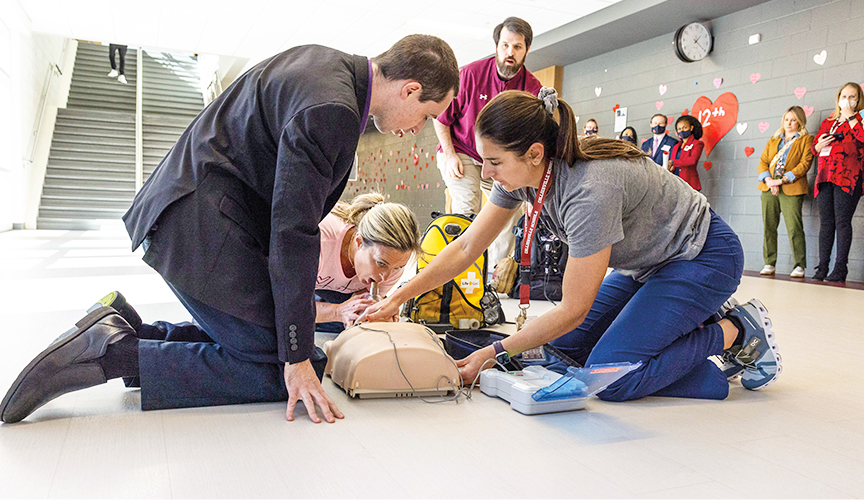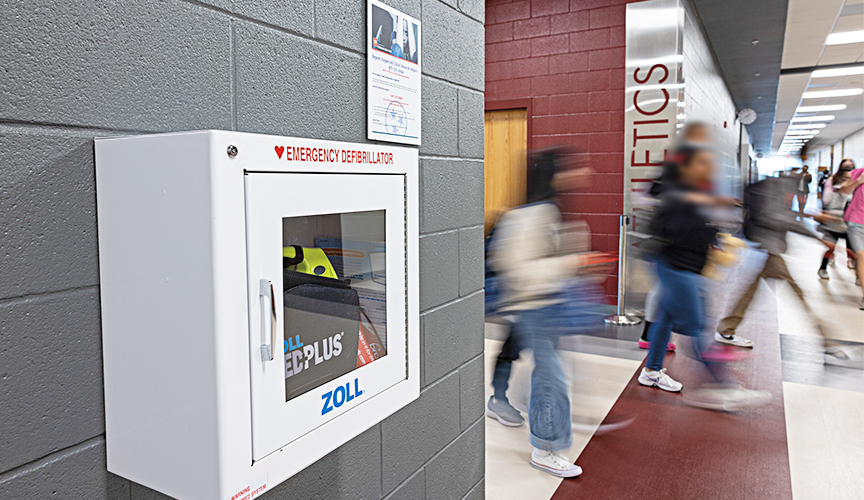The Heart of the Matter
A child having a health emergency at school is a terrifying prospect for any educator. But thanks to education and training by Le Bonheur cardiologists through Project ADAM: Lawson’s Legacy, schools are prepared to intervene during a cardiac emergency and provide emergency care until paramedics arrive. This intervention has the potential to be lifesaving.
“My background as a pediatric intensive care unit (ICU) nurse taught me that if you fail to plan, you plan to fail,” said Nina Campbell, BSN, RN, a school nurse at Arlington High School, located outside of Memphis, Tenn. “Our school district utilized Project ADAM to help establish an action plan for responding to medical emergencies. I am confident that if the time comes our team will be ready to help save a life.”
Project ADAM was founded in 1999 after the death of Adam Lemel, a 17-year-old Wisconsin high school student who collapsed and died while playing basketball. An automated external defibrillator (AED) could possibly have saved his life. Adam’s parents created the program in his memory. Project ADAM provides free education and planning assistance to schools, administrators, nurses, athletic trainers, coaches and other staff about how to respond to sudden cardiac arrest (SCA).

Through Project ADAM: Lawson’s Legacy, Le Bonheur cardiologists train schools on how to respond to a cardiac emergency. Above, pediatric cardiologists observe a drill at a local high school as part of the “Heart Safe” designation process.
Le Bonheur’s chapter of Project ADAM, Lawson’s Legacy, is named for Lawson Wherry, a Memphis native who showed no signs of heart dysfunction before he died after his heart suddenly stopped. To share and further his legacy, Lawson’s family joined the effort to bring Project ADAM to the Mid-South region through Le Bonheur.
Le Bonheur Pediatric Cardiologists Karine Guerrier, DO, MPH, Jennifer Kramer, MD, and Kaitlin Ryan, MD, lead the efforts for Project ADAM: Lawson’s Legacy, helping schools earn the “Heart Safe” designation. The process of achieving this designation begins with a review of a school’s cardiac emergency action plan (EAP), which could save the life of a student, staff member, parent or visitor who experiences SCA.
The pieces of a comprehensive EAP include access to an AED, a staff coordinator for AED maintenance and training, a written plan and the creation of a first responder team trained in CPR, AED and the EAP. The teams and schools must also complete a practice drill with the AED at least once a year.
For Campbell and the Arlington Community Schools district, Project ADAM was utilized to conduct the annual CPR and AED training required of schools by Tennessee law. She says that this training allows “the appropriate people to be in place to take quick action when seconds count.”

When someone suffers sudden cardiac arrest, their chance of survival can be doubled or tripled with early response with CPR, rapid defibrillation with an automated external defibrillator (AED) and quick activation of emergency medical services.
“Our aim with Project ADAM: Lawson’s Legacy is to provide schools and the community with the tools to recognize, prevent and treat SCA in children, adolescents and adults,” said Guerrier. “Someone experiencing SCA could be successfully treated through an early response with CPR, rapid defibrillation with an AED and quick activation of emergency medical services. This can double or triple a person’s chance of survival.”
Campbell has already seen how the training has benefitted schools in the district.
“Going through emergency scenarios with the staff at our schools is beneficial because it alleviates some of the unknowns and helps reduce the anxiety that can surround responding to these types of situations,” she says.
These interventions and training are particularly important for schools in rural areas that can be as much as half an hour away from the nearest ambulance service. Kramer says that across the state, these programs are teaching students and school staff to be proactive and ready in school and in the community.
“The more involved the kids are in learning about heart-safe protocols in school, the more awareness that exists in the community,” adds Ryan, “They can be aware of potential dangers and feel empowered to help or respond to a crisis.”
Help us provide the best care for kids.
Le Bonheur Children's Hospital depends on the generosity of friends like you to help us serve 250,000 children each year, regardless of their family’s ability to pay. Every gift helps us improve the lives of children.
Donate Now
















